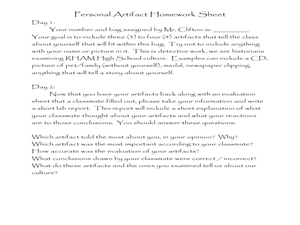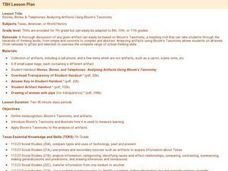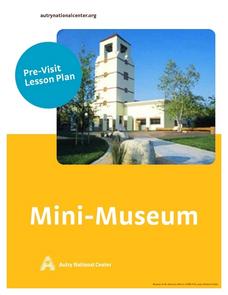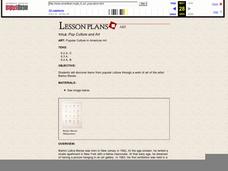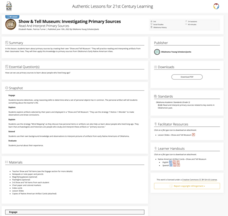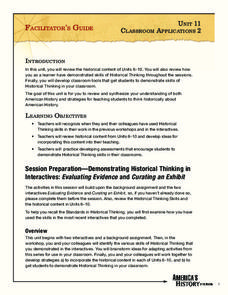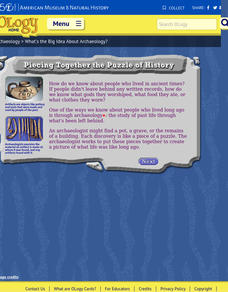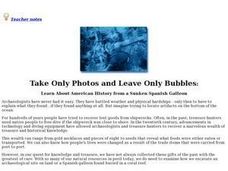Smithsonian Institution
World War I
How did World War I effect the United States' status as a world power? Pupils examine a website to learn many interesting facts about American involvement during World War I. They read passages and interact with artifacts in an online...
K12 Reader
What is a Tribal Government?
What is life like on a Native American reservation? Learn about the ways a tribal government works with a reading comprehension activity. After reading a short passage, kids use context clues to answer five comprehension questions.
Curated OER
Introduction to Native Americans Thematic Unit
Students consider different cultural viewpoints. In this Native American history lesson, students examine artifacts and then conduct research on selected Native American tribes.
Curated OER
Native Americans of Rockland County
Students comprehend Native American cultures through the use of both secondary and primary sources. They explore and investigate Native Americans in New York State. Students are shown some old Indian arrowheads and they are challenged...
Curated OER
Personal Artifacts
Ninth graders put their observation skills to work. In this observation skills lesson, 9th graders examine personal artifacts that their instructor has gathered. Students take notes on the artifacts they analyze and write lab reports...
Curated OER
Analyzing Artifacts Using Bloom's Taxonomy
Seventh graders apply Blooms Taxonomy to analyze a collection of artifacts. They define and discuss the nature of artifacts and work in groups to complete handouts. Students analyze an object (stone pipe) on a mystery artifact analysis...
Curated OER
Stones, Bones & Telephones: Analyzing Artifacts Using Bloom's Taxonomy
Seventh graders define metacognition, Bloom's Taxonomy, and artifacts. They, in groups, try to identify a mystery artifact using the Artifact Analysis sheet. They present their findings to the class.
Curated OER
Native American Cultures for Grades 4-5
Students investigate Native American culture by researching the Internet. In this U.S. History lesson plan, students read online field reports about exploration and the history of Native Americans in the United States. Students create...
Curated OER
Mini Museum
Students brainstorm about the different types of museums and complete a worksheet by looking at artifacts and what they think that object did. They work together in groups to complete a KWL chart throughout the lesson plan.
Curated OER
Pop Culture and Art
Learn about American pop culture, art, and the social voice that art can convey. The class discusses the life and art of Barton Benes, views his piece Reliquarium, then discusses what they see and feel when they view his work. Make sure...
K20 LEARN
Show and Tell Museum - Investigating Primary Sources: Read and Interpret Primary Sources
Scholars become detectives in a lesson that focuses on primary sources. Learners practice their observational skills by examining the teacher's artifact and visiting the Show and Tell Museum that highlihgts items from peers and learning...
Smithsonian Institution
Western Indian Wars
Why do many Native Americans live on reservations? An interactive resource teaches about how reservations came to be and the tragic history behind Native Americans moving from their lands. Teenagers read passages, view images, and click...
US House of Representatives
Objects in Time
Artifacts can be used to study people and events of the past. That's the takeaway from the fifth lesson in a unit study of African Americans who served in Congress. Groups select an artifact associated with a Black Congress Member from...
Channel Islands Film
Cache: Lesson Plan 1 - Grades 9-12
Archaeologists have discovered a cache of Native American relics. They want to preserve these relics by removing them from the rapidly eroding site to a lab where they can be studied. Native American traditions demand that the items be...
Smithsonian Institution
World War II
December 7th is remembered as a tragic time in American history, but some scholars may not know why. The resource explains the significance of the bombing of Pearl Harbor as well as how World War II relates to American history. The...
Annenberg Foundation
America's History in the Making: Classroom Applications Two
Reading between the lines helps discover important information! The 11th lesson of a 22-part series on American history has scholars use historical thinking skills to uncover the deeper meaning behind the words on a page. Using backward...
Pardee Home Museum
Geography of Alaska
A unit on the 49th state covers a variety of topics from the geography of Alaska to Native American myths. Academics work to analyze information found in primary source materials including old newspaper articles and artifacts. Young...
Smithsonian Institution
Vietnam
What do Dwight D. Eisenhower, Lyndon B. Johnson, and communism have in common? They all have something to do with the Vietnam War. Scholars engage in readings, view related images, and read about important artifacts on the website.
Smithsonian Institution
Cold War
The Cold War was not necessarily always cold in temperature, but the relationship between the United States and the Soviet Union sure was frigid! Scholars read various passages, view exhibition graphics, and observe an artifact from the...
National Park Service
Maltese Cross Cabin
The Maltese Cross Cabin, a frontier residence of Theodore Roosevelt, is a time capsule that commemorates Roosevelt's time in the Dakota territory. An explanatory video and response guide takes students on a virtual tour of the wooden...
Curated OER
The Earliest Americans
The topic of the peopling of the Americas offers the opportunity for a fascinating discussion. Give your class the knowledge they need to understand the migration across Beringia, the hunter-gatherer lifestyle, and the impact of...
American Museum of Natural History
What's the Big Idea About Archeology
The American Museum of Natural History offers a website sure to engage young anthropologists. Learners can dig into a site that offers an explanation of the field of archaeology, the kinds of questions archaeologists ask that launch...
Curated OER
Take Only Photos and Leave Only Bubbles: Learn About American History from a Sunken Spanish Galleon
Students simulate the research process of investigating a shipwreck. In small groups, they conduct Internet research, and develop and write a proposal for excavation of the archaeological site.
Jamestown-Yorktown Foundation
Life of a Private Lesson Plan
In order to understand the challenges the Continental Army faced during the American Revolution, class members analyze primary source materials including a soldier's journal and an officer's letter, and watch a short reenactment video.






